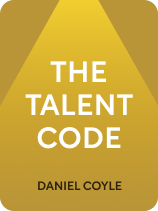

This article is an excerpt from the Shortform book guide to "The Talent Code" by Daniel Coyle. Shortform has the world's best summaries and analyses of books you should be reading.
Like this article? Sign up for a free trial here.
What is deep practice? Why is deep practice important?
If you want to build talent, you’ll need to build myelin in the brain. However, to build myelin, you need to engage in deep practice.
Keep reading to learn the importance of deep practice for myelin production, according to Daniel Coyle’s book The Talent Code.
What Is Deep Practice?
Deep practice, according to Coyle, is an intensely focused, targeted repetition of skills at the edge of your ability. It should be doable, but push you just beyond the limits of your current skill set. In other words, you aren’t simply repeating an action you already know how to do well—you should be struggling to perform the action. This “development zone,” the state of struggle between an action you know well and what you want to achieve, takes concentrated effort and focus. You’re working on a skill that’s new to you and therefore doesn’t come naturally.
Crucially, Coyle notes, in the development zone, you will repeatedly make mistakes and correct them. This is essential because you build more myelin when you make mistakes. He explains that struggling and making mistakes when attempting a certain action signals to your brain that your current neural connections controlling the action are suboptimal. It responds by reinforcing these connections through myelination.
(Shortform note: Coyle’s discussion of the “development zone” aligns with the educational psychology concept of the “Zone of Proximal Development” (ZPD). The ZPD—the gap between what a student can and can’t do on their own—is the key focal point for achieving a task’s next level of mastery. Lev Vygotsky, the psychologist who developed this concept, emphasized that a student needs three components to learn: supportive activities that carry the student to the next level; social interaction, including dialogue and collaboration; and a knowledgeable coach or teacher. As we’ll see through the rest of this guide, these criteria align closely with Coyle’s elements of meaningful practice, impassioned motivation, and coaching.)
You might think of deep practice as mental weightlifting: You have to lift increasingly heavy weights to build up your muscle. If you were to repeatedly lift small, easy weights, your muscles wouldn’t grow and you wouldn’t become stronger. In the same way, you must practice increasingly challenging skills to build your myelin. If you practice an easy action repeatedly, your myelin won’t grow and your skills will plateau.
Why Deep Practice Is So Effective
Deep practice is more effective than mere repetition because it challenges homeostasis—the level of stress or exertion to which your body is accustomed. The principle is well-understood by physical trainers: To make progress at the gym, you need to exert your muscles and cardiovascular system to the point where your body can no longer maintain homeostasis. Once this happens, your body adapts to reach homeostasis at a new level and will change in ways that enable you to run that extra mile or lift that extra 50 pounds.
The same principle applies to the human brain. The more you push yourself, the more the structure and chemistry of your brain will adapt to meet the new challenges. Of course, just like in the gym, you can’t push yourself too hard—that will only lead to burnout. But by forcing yourself to go just beyond your comfort zone into the development zone, you can begin to trigger remarkable structural changes.
How to Practice Meaningfully
Now that you know the importance of deep practice, how do you go about doing it? Coyle outlines four methods for practicing meaningfully: chunking, staying attuned to flaws, condensing, and committing to repetition.

———End of Preview———
Like what you just read? Read the rest of the world's best book summary and analysis of Daniel Coyle's "The Talent Code" at Shortform.
Here's what you'll find in our full The Talent Code summary:
- A deep dive into where great talent comes from
- The key elements of the type of practice you need to develop talent
- Why it's never too late for greatness, if you know how to grow it






